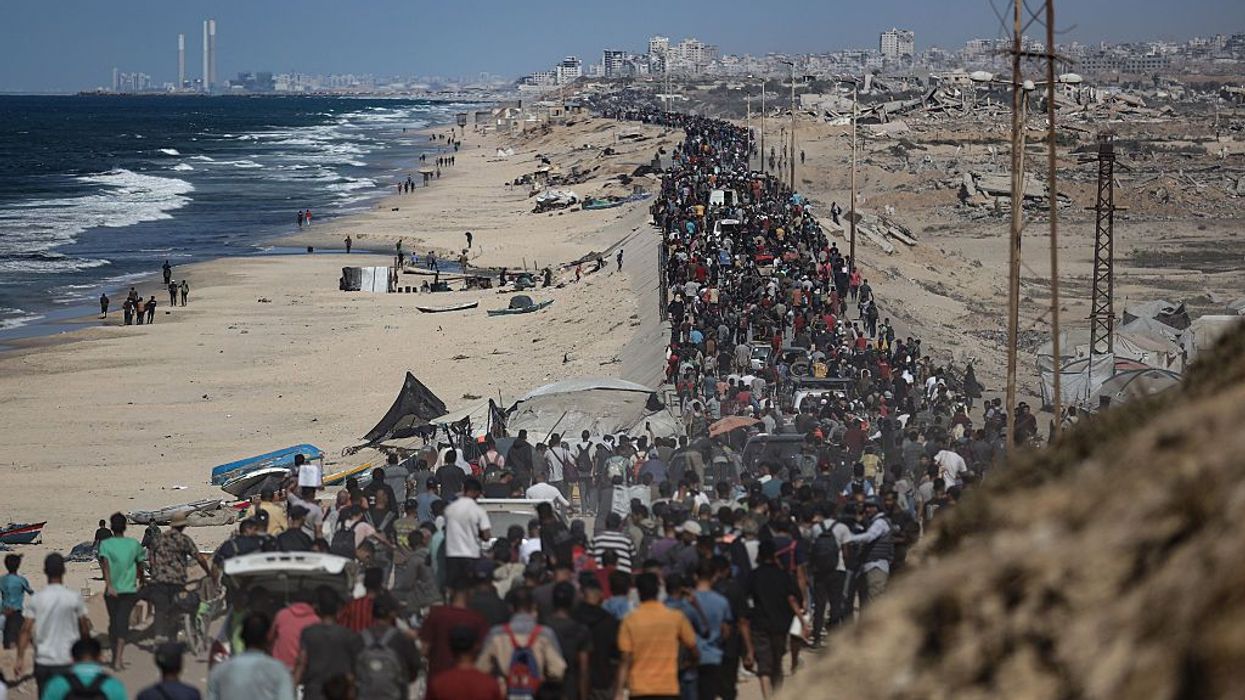The manufactured scarcity forced Palestinians to dig tunnels underground to smuggle in food and essential supplies. In 2012, The Guardian reported on a leaked U.S. diplomatic cable quoting Israeli officials who described their objective: to “keep Gaza’s economy on the brink of collapse.” Gisha called the policy what it was: economic warfare.
What’s unfolding in Gaza today is the result of a strategy decades in the making. The Oslo Accords appeared to offer Palestinian self-rule but, in reality, denied any true sovereignty. Israel maintained full control over borders, security, and the movement of people and goods, while delegating limited responsibilities—like health and education—to the PA. What seemed like a step toward statehood instead institutionalized forced dependency. As the late Palestinian-American intellectual Edward Said put it, Oslo was “an instrument of Palestinian surrender—a Palestinian Versailles.”
Starvation is the final phase of Oslo.
When Starvation Becomes Too Visible to Spin
For years, Gaza’s starvation was engineered quietly—camouflaged behind border policy, calorie math, and diplomatic doublespeak. But hunger at its peak is harder to justify than bombs. Even the institutions once trusted to manage the narrative are starting to shift.
Ross Douthat, a columnist for The New York Times, published a piece on July 26, 2025, titled “How Israel’s War Became Unjust.” This admission is particularly notable given the Times’ long-standing role in amplifying Israeli military narratives—a pattern thoroughly documented by the activist collective Writers Against the War on Gaza (WAWOG).
Even so, on July 30, 2025, the Times updated an earlier front-page story under pressure from pro-Israel groups. The piece had shown a haunting image of Mohammed Zakaria al-Mutawaq, a starving child in Gaza. The correction read: “Had the Times known the information before publication, it would have been included in the article and the picture caption.”
At face value, it’s a standard correction. But in practice, it functions as narrative damage control to cast doubt on the visual evidence of starvation. By adding ambiguity the correction served to blunt the emotional and political impact of the Times’ own reporting.
This fits a long-standing pattern. For decades, the Times has repeatedly framed Israeli violence as security, while treating Palestinian suffering as either self-inflicted or incidental. It amplifies the Israeli military’s talking points, dilutes Palestinian testimony with qualifiers, and routinely fails to name the occupation as a root cause.
So why, after months of justification and denial, has the Western press—especially the Times—begun to acknowledge the scale of atrocity in Gaza?
Because starvation resists spin in ways bombs do not.
Mass casualties can be reframed as “collateral damage.” But starvation speaks a deeper, more primal language. It exposes horror that cannot be softened by euphemism or hidden behind military jargon. It leaves behind emaciated bodies and hollow eyes—images that no narrative of necessity can justify. At some point, the brutality becomes so undeniable, so unspinnable, that even the monster flinches at its own reflection.
But not always.
While the American Jewish Committee feigned condemnation of Rep. Randy Fine’s (R-Fla.) genocidal incitements, the New York Post dug in. Meanwhile, Rep. Marjorie Taylor Greene (R-Ga.) became the first Republican to explicitly call Israel’s assault on Gaza a genocide. Rep. Thomas Massie (R-Ky.) has also broken ranks, consistently opposing U.S. military funding to Israel.
More Than a Crime: Gaza and the Case for Societal Torture
The images that finally forced even reluctant Western media and political elites to confront Gaza’s reality were never ambiguous to legal scholars. For years, they’ve argued that starvation is not collateral damage but a deliberate weapon of war that demands its own category of prosecution.
Tom Dannenbaum, a legal scholar, in his 2021 article “Siege Starvation: A War Crime of Societal Torture,” argues that siege starvation must be treated as a distinct war crime—not merely a form of inhumane treatment, but a method of torture at the societal level.
To bomb people—to sever limbs, level large swaths of infrastructure, or extinguish entire bloodlines—is one kind of horror. But to starve a mother until her breasts run dry, and then shoot her as she walks toward aid, is another. It is an assault not only on her body, but on her capacity to mother, to love, to decide, to hope.
Dannenbaum warns that starvation is uniquely insidious because it does not only destroy the individual—it unravels the social bonds that hold a people together. It targets not just “political commitments, but also at the human capacity for friendship and love.” Writing for Just Security, Dannenbaum, and Alex de Waal who is the foremost expert on famine, deepen this point: “Human existence is based upon sharing food. The etymology of the word ‘companion’—someone with whom one shares bread—is just one indicator of how deep this goes. When people can no longer share bread but must instead fight one another for scraps, human society is severely impacted in its ability to function. This is what we see unfolding in Gaza today.”
This is what Israel’s starvation of Palestinians aims to break: the human capacity to hope, to care, to endure.
This is why he calls siege starvation “a crime of societal torture”: because it is designed to dismantle human agency and break political will.
Starvation is already illegal, prosecutable as a war crime under the Rome Statute of the International Criminal Court, and—when used with the “intent to destroy, in whole or in part, a national, ethnical, racial, or religious group”—prosecutable as genocide under the Genocide Convention. The law is clear; what’s missing is prosecuting siege starvation.
At Nuremberg, prosecutors presented compelling evidence of how the Nazis used starvation as a weapon of war. Defendants were convicted under charges like “crimes against humanity” or “extermination.” However, the courts didn’t call the starvation of civilians during the siege of Leningrad illegal, only abhorrent. Why? Because the Allied powers had also used siege starvation during the war. Prosecuting it would have meant putting themselves on trial too. Prosecutors cited Lieber Code (Art. 17), drafted for the Union Army during the American Civil War, as permitting the use of starvation to hasten military victory.
In other words, the legal precedent for ignoring siege starvation came from the United States.
As de Waal notes, in his article “Nazis used it, We use it,” the Allies’ own tactics included Britain’s blockade of Germany in World War I, which killed an estimated 750,000 civilians, and the U.S. Air Force’s 1945 “Operation Starvation,” which mined Japanese harbors, killing civilians as well as soldiers.
So why does it matter if siege starvation has its own category of prosecution? As Dannenbaum explains, when it’s folded into other charges, the most devastating part of the harm—the dismantling of a community’s ability to live and function together—vanishes from view. It slips into the background of “military strategy” or “counterterrorism,” protected by the political power of those who use it. This silence masks the crime, allowing siege starvation to persist not only as a weapon of war, but as a long-term strategy of domination.
History, tragically, has seen starvation as a tactic of domination before.
The Arc of History Bends Back on Itself: From the Holocaust to Gaza, Starvation as Policy
To fully grasp the gravity of siege starvation, we have to place it within the broader historical and legal arc. Legal scholars like Dannenbaum aren’t alone in urging us to recognize starvation as a distinct crime and prosecute it as such. De Waal also echoes this view. He also notes that modern starvation is almost never due to weather—it’s political.
Yet, as de Waal notes, modern genocide scholars have largely neglected starvation in their analyses—although Raphael Lemkin, who coined the term “genocide,” studied such tactics in great detail. Lemkin focused specifically on what he called “racial discrimination in feeding,” citing Nazi policies that rationed food based on ethnicity: 100% of carbohydrates for Germans and only 27% for Jews. He also documented how the Nazis intensified suffering through overcrowding, denial of medicine, and calculated neglect. Starvation was not a byproduct of war—it was policy.
These mechanisms are chillingly mirrored in Gaza today. Israel has imposed the longest siege in modern history, enclosing over 2 million Palestinians within a narrow strip of land, restricting access to food, water, fuel, and medical supplies. Palestinians have been herded into ever-tighter spaces as bombs fall around them. The conditions are not dissimilar from those Lemkin once described.
What’s different with Gaza is not the tactic—it’s the visibility. This time, the evidence isn’t buried in archives. It is live-streamed. And yet, even in the face of such clarity, much of the West continues to equivocate.
The Unmaking of Palestinians
What happens when a tactic left unprosecuted becomes a tactic perfected? The absence of legal accountability has allowed the practice of siege starvation to evolve—methodically, devastatingly—into a centerpiece of modern warfare. And nowhere is that clearer than Gaza.
In an interview with DemocracyNow! on July 21, 2025, de Waal offered a chilling assessment: “I’ve been working on this field of famine, food crisis, and humanitarian action for more than 40 years, and there is no case, over those four decades, of such minutely engineered, closely monitored, precisely designed mass starvation of a population as is happening in Gaza today.”
He elaborated further in a separate conversation with Michael Young, senior editor of Diwan, emphasizing that what sets Gaza apart is not only the precision of its deprivation but its reversibility: “The starvation of Gaza is unique, however, in that the situation can be remedied overnight if Israel chooses to do so.” He added, “If Israeli Prime Minister Benjamin Netanyahu were to decide that every child in Gaza should have breakfast tomorrow, it could be done.”
Put plainly: Israel’s starvation of Gaza is strategic.
The punishment of Gaza is a message to the world: If you fight for freedom, you will be starved and erased.
However, the effects of starvation in Gaza—biological, psychological, and generational—began decades before the headlines reached Western front pages. In July 2025, NPR reported growing concern about how starvation may shape future Palestinian generations—not just through deprivation, but through genetic alteration. Professor Marko Kerac of the London School of Hygiene and Tropical Medicine warned: “It’s a lifelong thing. It’s even across generations.”
A February 2025 study on genetic changes in Syrians who endured siege violence offers insight into the intergenerational harms and lasting effects of such conditions. In 1982, the Syrian regime besieged the city of Hama, killing tens of thousands. Decades later, scientists studying descendants of women pregnant during the siege discovered lasting genetic imprints of that trauma—even in grandchildren who never experienced it directly. The Hama siege lasted less than a month. Gaza has been besieged for nearly two decades. If a siege lasting less than a month left genetic scars across generations, what then of Gaza?
In truth, Palestinian children and adults in Gaza have faced long-term nutritional deprivation for decades. Between 2000 and 2010, stunting rates—a clinical sign of chronic malnutrition starting in the womb—rose from 7.5% to over 10%. (By 2007, Israel had already implemented a policy of putting Palestinians “on a diet.”) By 2010, Gaza’s stunting rate had climbed to 13%, compared with just 8% in the West Bank. A 2018 public health study revealed that 1 in 5 children in Gaza were stunted by age two—double the national average just years earlier. By 2013, 85% of Gaza’s population was food insecure.
UNICEF and public health experts have consistently identified the political and economic blockade as the driving cause.

However, one doesn’t need charts or spreadsheets to recognize the toll of calorie restriction. As Dr. Ahmad Yousaf, an American physician volunteering in Gaza, put it at a press conference on July 31, 2025: “It doesn’t take a doctor to recognize the signs of starvation—and the starvation didn’t start this week. It takes months of deprivation for a body to show temporal wasting, for cachexia to set in, for every single rib to become visible. You don’t need a medical degree to understand what these people have been through. I stand in front of news crews, I stand on the streets, and every person I see looks malnourished. In the hospitals we work at in Arkansas, we would diagnose every single one of them with severe protein malnutrition.”
To fully grasp the cruelty of this strategy, we must zoom out. In 2004, Prime Minister Ariel Sharon—widely condemned for his role in the 1982 Sabra and Shatila massacre—announced Israel’s “disengagement” from Gaza. His chief of staff, Dov Weisglass, described the real intent: “The disengagement is actually formaldehyde. It supplies the amount of formaldehyde that is necessary so there will not be a political process with the Palestinians.”
After Hamas’ 2006 election victory, siege logic became more brutal. That March, amid growing food scarcity, Weisglass said: “It’s like an appointment with a dietician. The Palestinians will get a lot thinner, but won’t die.”
Fast forward to 2025: up to 20% of Gaza’s population has been annihilated. And those who remain face not just airstrikes, but the slow violence of state-engineered starvation.
Palestinian reporter Anas al-Sharif, speaking from Gaza, warns of mass hunger he witnesses daily. According to the Integrated Food Security Phase Classification (IPC), roughly 470,000 people in Gaza are now in Phase 5—classified as “catastrophe”—the most critical and dangerous stage of food insecurity, often irreversible if food becomes available later.
Starvation as Resistance Management
Having reduced the body to hunger, siege warfare turns next to the spirit.
What’s at stake in Gaza is more than politics, sovereignty, or borders. To raise a family under siege while both parent and child are hungry; to remember your history, to share food with your neighbor when survival would suggest turning inward—this is love as resistance.
This is what Israel’s starvation of Palestinians aims to break: the human capacity to hope, to care, to endure. Israel seeks to reduce every person to a creature of need, unable to give or choose, to have aspirations for freedom.
This is the logic of what scholars call “social death”—the deliberate collapse of social fabric and human interdependence. Starvation, then, is not just biological warfare. It is the violent unraveling of community. As the late philosopher Claudia Card argued, “Groups themselves have a collective ‘life,’ and that ‘life’ can ‘die.’”
In Gaza, starvation is a strategy of erasure that has become a spectacle—watched by a world that rarely intervenes.
The New Global Order: Starvation and Spectacle
While Western governments and legacy media have downplayed—or deliberately obscured—the genocide and mass starvation unfolding in Gaza, much of Israeli society displays little ambiguity about its intent. Some religious figures have gone so far as to demand that every child in Gaza be denied food. For those with the stomach to confront this depravity, the human rights organization Al-Haq has catalogued a damning archive of genocidal statements by Israeli officials and public figures.
Meanwhile, according to a late July poll, 79% of Israeli Jews said they were “not so troubled” or “not troubled at all” by reports of famine and mass suffering among Palestinians in Gaza. Crowds gather on hilltops to watch the bombing of Gaza—“the best show in town.” As they barbecue, they gleefully watch with binoculars Gaza’s theater of suffering.
The image of brown, emaciated bodies has long been a familiar spectacle in the Western imagination: A conquest. The unspoken echo of a modern-day crusade.
To be clear, not all in the West share this worldview. Public opinion, especially among younger generations and marginalized communities in the U.S., has shifted. And yet, a deeper cultural conditioning remains—one that renders Palestinian suffering invisible. At best, it is seen as regrettable collateral. At worst, it is framed as punishment.
What sets this moment apart is the unapologetic display of horror. The Nazis, at the height of their crimes, still tried to hide the evidence. Israel does not bother. It carries out genocide in full view—as if daring the world to intervene. The world, instead, averts its gaze.
What Gaza Tells Us About Our Own Future
What we’re witnessing in Gaza today is the culmination of Oslo's final form. It’s now time to lay the corpse of the two-state solution beside the corpse of Oslo. Anyone still invoking that phrase is either deluding themselves or seeking to erase Palestine forever.
This is not only a political failure; it is a moral one. At its core, Israel is at war with the very idea of humanity—with the possibility of justice, dignity, and moral order in a world governed by power.
There are only two mechanisms capable of halting this genocide. If Washington told Israel to stop, it would. American financial, military, and diplomatic support is the lifeblood of this genocide. But the U.S. will not act until it’s too late—because this violence reflects its own imperial posture: Israel is the West’s avatar—a lonely democracy fighting barbarism. Zion becomes Christendom’s vanguard. Gaza becomes a proving ground for empire.
Short of a miracle, resistance from the Arab and Muslim world is no more promising. They are fractured, subdued, or complicit.They issue statements, but take no actions that carry real cost.
Which brings us to the truth. The punishment of Gaza is a message to the world: If you fight for freedom, you will be starved and erased. And no one will come for you, your children, or your city. Gaza shows us those who love too deeply, resist too firmly, and care too radically are most at risk of being erased.
Some of us have surrendered our claim to a moral existence. We cling to the illusion that if we are quiet enough and careful enough, we will be spared.
Yet, others stubbornly persist, the best they can, because the cries of the helpless leave no choice. As a blind 79-year-old Palestinian man implored: “All my children have died... and this Nakba is harder than the Nakba of 1948. First God... then you. We need someone to stand with us.”





